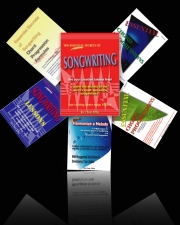by Gary Ewer, from “The Essential Secrets of Songwriting” website:
Did you know that chord progressions are not protected by copyright? That’s mainly because, try as you might, you can’t find an original progression. And if you can, it probably stinks. 😉 Not because you can’t write good progressions, but the good ones have likely been used already, leaving you with all the ones that don’t work.
A chord progression formula may not be something you’ve tried before. If you’re like most songwriters, you probably feel that you can make better use of a list of progressions.
So what is a formula? It’s simply a list of chords represented by numbers that will transpose into any key, and will serve as a guide to allow you to create your own progressions. Continue Reading
__________________________________________________________
IF CHORD PROGRESSIONS MYSTIFY YOU, THE ANSWER IS HERE.
If you don’t know all the essential secrets of songwriting, you’re wasting time!
 “Hi Gary, I just love all of your e-books. I do hip hop as well as other styles like r&b, neo soul, and jazz. I often refer to your e-books for inspiration. You have been stellar in my book. Keep it coming.”
“Hi Gary, I just love all of your e-books. I do hip hop as well as other styles like r&b, neo soul, and jazz. I often refer to your e-books for inspiration. You have been stellar in my book. Keep it coming.”
Francis (U.S.)
Let these six downloadable e-books start show you the chord progressions and songwriting techniques everyone should be using! Moments from now you can be writing great songs, and fixing every bad song you’ve ever started!
Click Here to Become a Better Songwriter NOW!
_________________________________________________________
Chord progression formulas exist because chords like to move in specific ways. Allowing chords to move in this way makes your progression strong – makes it work. If none of the progressions upon which your song is based is strong, you possibly have a major problem with the harmonic structure of your song.
Songs work nicely if they use a mixture of strong (formula-based) progressions, along with a few surprise (“fragile”) chords. This practice of mixing strong and fragile progressions is something that is centuries-old. Did you know that J.S. Bach used this very approach? So did Mozart, Cole Porter, and so did The Beatles. And don’t forget Carole King, Bruce Springsteen, Neil Young, Elton John, Taylor Swift, Beyoncé, and pretty much any other songwriter out there making music.
Which brings up an important point. It’s not the chord progression that makes your song original or not. It’s you, your approach, your basic beat, your instrumentation, your background vocals, your style… YOU. Why do you think old songs from 30, 40 or 50 years ago can make it so easily today when they’re re-released by a new young pop star? The chords are the same, the melody’s the same, but the style is new!
So will using a chord progression formula make your song predictable and boring? No, because chord progressions, well-written, should be more or less transparent. There are subtle changes from decade to decade (such as a preponderance of 7th chords in the 70s), but these minor aspects of chords are not part of chord progression formulas. You primarily want chords that work, and then, make that song original by what you do on top of that progression.
Will chords that don’t adhere to a formula work? Yes they will, and some groups use more of these original progressions than others (Genesis, Yes, Jethro Tull, Rush, Gentle Giant, etc.) But they’re tricky to use, and you need to confidence of letting your ear be your guide as to whether they’re really working or not. What you’ll notice about these prog rock bands is that they still balance unique progressions with stronger ones. I think you’ll find that balance is still key to getting a progression to work.
If you’d like to use some great chord progression formulas, but don’t know where to start, I’ve written an ebook with formulas you can use. “Chord Progression Formulas” is part of “The Essential Secrets of Songwriting” 6-Ebook Bundle. Click here to read more about that suite of songwriting ebooks.










Interesting thought that chords are not copyrighted. Its not something I thought about but I guess its true. Surely that makes it difficult for artists to protect their intellectual property?
The idea there is that chord progressions are very common between songs. You can find the same chord progression in dozens, possibly hundreds of songs. The intellectual property is really the melody and the lyrics.
G
True true on that. Gets me thinking about my fave hip hop artist Mickey Factz who’s raps is a crowd pleaser!
J’adore votre site, le contenu est vraiment de qualité ! bonne chance pour la suite 😉
Great entry Gary. I have been trawling through a few songwriting blogs and yours is definately one I plan to return to. I love your way of expressing chord colours as strong and fragile. It somehow expresses the tension that the comparison creates in the music in much more piquant terms than usual!